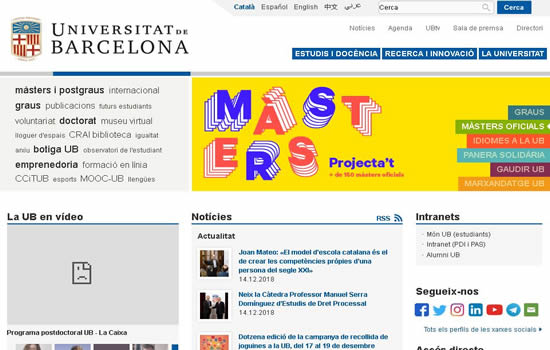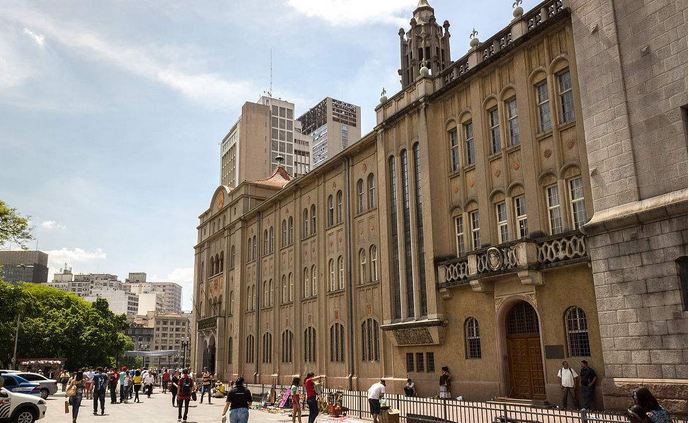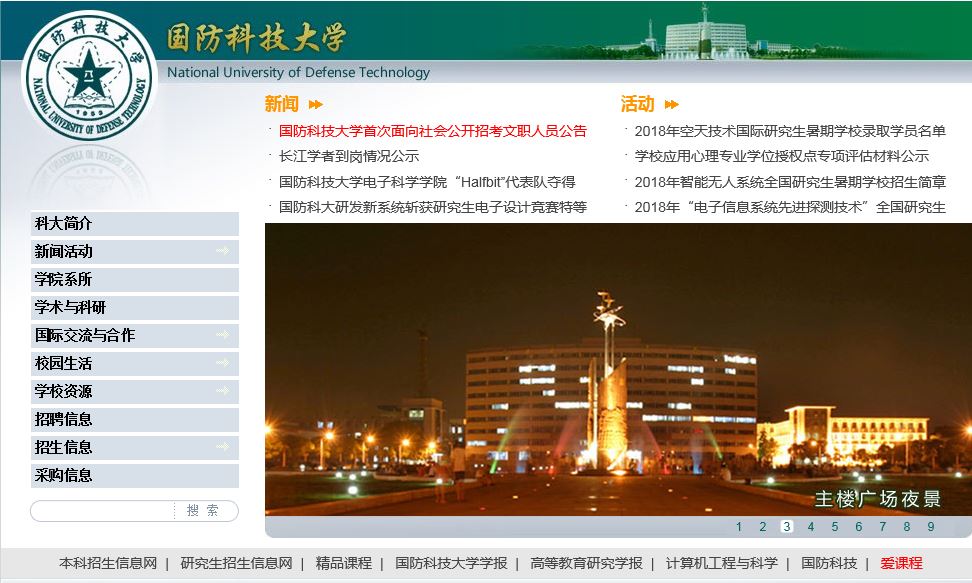选择热点
 荷兰莱顿大学
荷兰莱顿大学 西班牙巴塞罗那大学
西班牙巴塞罗那大学 巴西圣保罗大学 University of Sao Paulo, Brazil
巴西圣保罗大学 University of Sao Paulo, Brazil 台湾南华大学 University of South China in Taiwan
台湾南华大学 University of South China in Taiwan 科技大学 National University of Defense Technology
科技大学 National University of Defense Technology 南京大学 Nanjing University
南京大学 Nanjing University 上海复旦大学 Fudan University
上海复旦大学 Fudan University 泗水大学(Ubaya)
泗水大学(Ubaya) 印尼大学 universitas indonesia
印尼大学 universitas indonesia 越南某大学 Vietnam National University
越南某大学 Vietnam National University 菲律宾大学 University Of The Philippines
菲律宾大学 University Of The Philippines
(中英)现代散文:一个车夫 A Rickshaw Boy
发布时间:2025-01-06
来源:大学网站
A Rickshaw Boy一个车夫◎ Ba Jin◎ 巴 金These few days I have been staying in the home of my friend Fang.
这些时候①我住在朋友方的家里②。
One day, it had rained until we finished supper.
The sky was gradually clearing up, and the evening air was nice and cool.
Fang suggested that we go to the park.
有一天我们吃过晚饭,雨已经住了,天空渐渐地开朗起来。
傍晚的空气很凉爽。
方提议到公园去。
Rickshaw, rickshaw!
we called out from a street corner.
"To the back gate of the park!
"洋车!
洋车!
公园后门!
”我们站在街口高声叫道③。
Soon we found ourselves surrounded by a group of rickshaw men with their vehicles.
一群车夫拖着车子跑过来,把我们包围着。
No sooner had we each quickly got on a rickshaw than the rickshaw pullers started to run.
我们匆匆跳上两部洋车,让车夫拉起走了。
Seating myself leisurely, I was surprised when my eye fell on the swaying thin back of the rickshaw puller.
Oh my, it's a small kid!
He must be no more than fourteen.
我在车上坐定了,用安闲的眼光看车夫。
我不觉吃了一惊。
在我的眼前晃动着一个瘦小的背影。
我的眼睛没有错。
拉车的是一个小孩④,我估计他的年纪还不到十四。
Kid, how old are you?
I asked.
小孩儿,你今年多少岁?
”我问道。
Fifteen!
he answered with so much self-assurance and pride as if he had already come of age at fifteen.
He took hold of the shafts and started running ahead — the very picture of unflagging energy.
十五岁!
”他很勇敢、很骄傲地回答⑤。
仿佛十五岁就达到成人的年龄了。
他拉起车子向前飞跑。
他全身都是劲⑥。
How long have you been in this trade?
I continued.
你拉车多久了?
”我继续问他。
More than six months, said he with no less pride.
半年多了,”小孩依旧骄傲地回答。
How much do you earn a day?
你一天拉得到多少钱?
”After paying the rent for hiring the rickshaw, I still have 20 strings of cash left!
还了车租剩得下二十吊钱!
”I understood it was equivalent to 40 cents.
我知道二十吊钱就是四角钱。
The small kid kept quiet as if he had not heard Fang's question.
Why didn't he answer?
I guessed there must be something behind it.
Maybe he didn't like to be asked about it at all.
Maybe he had no father, nor even mother.
这一次小孩却不作声了,仿佛没有听见方的话似的。
他为什么不回答呢?
我想大概有别的缘故⑦,也许他不愿意别人提这些事情,也许他没有父亲,也许连母亲也没有。
Do you have a father?
Fang, nevertheless, kept on questioning.
你父亲有吗?
”方并不介意,继续发问道。
No!
The reply was unhesitating.
没有!
”他很快地答道。
A Mother?
母亲呢?
”No!
The answer was as laconic as firm, apparently in a different tone.
There was a note of pain in his voice.
I thought he might not have told the truth.
没有!
”他短短地回答,声音似乎很坚决⑧,然而跟先前的显然不同了。
声音里漏出了一点痛苦来。
我想他说的不一定是真话。
I have a younger sister, said he without being asked, as if impatient of his own reticence.
"He sold her.
"我有个妹子,”他好像实在忍不住了⑨,不等我们问他,就自己说出来;他把我妹子卖掉了。
”I immediately understood who was meant by "he".
I realized this boy must have been suffering great misery in his life.
我一听这话马上就明白这个他”字指的是什么人。
我知道这个小孩的身世一定很悲惨。
我说:Where's your father now?
I demanded.
那么你父亲还在——”He went on without answering my question, "He took drugs, he deserted my mother, he sold my sister, he ran away.
"小孩不管我的话,只顾自己说下去:他抽白面,把我娘赶走了,妹子卖掉了,他一个人跑了。
”The four short sentences spoke volumes for the family tragedy.
What bitter experiences he must have gone through since early childhood!
这四句短短的话说出了一个家庭的惨剧⑩。
在一个人幼年所能碰到的不幸的遭遇中,这也是够厉害的了。
What a heartless father!
sighed the middle-aged rickshaw man.
"Where do you live now?
" He kept up the conversation with the little boy while running along with the rickshaw.
"You'd better slacken your pace a little bit to conserve your energy," he said.
"The gentlemen won't care.
"有这么狠的父亲!
”中年车夫慨叹地说了。
你现在住在哪儿?
”他一面拉车,一面和小孩谈起话来。
他时时安慰小孩说:你慢慢儿拉,省点儿力气,先生们不怪你。
”I live in chechang⑭.
For that I have to pay a rent of 100 coppers daily.
I put away what's left to buy.
clothes.
我就住在车厂里面。
一天花个一百子儿。
剩下的存起来做衣服。
”As 100 coppers was equal to 20 cents, he could save up 20 cents a day.
一百子儿”是两角钱,他每天还可以存两角。
The child is a real marvel, the middle-aged rickshaw man said to us with a note of admiration.
"He knows how to save up money for clothes.
" Then he again asked the child, "Did your father ever come to see you?
"这小孩儿真不易,还知道存钱做衣服。
”中年车夫带着赞叹的调子对我们说。
以后他又问小孩:你父亲来看过你吗?
”No, he dared not!
The brief answer, uttered in an uncompromising tone, showed great grievance against his father.
没有,他不敢来!
”小孩坚决地回答。
虽是短短的几个字,里面含的怨气却很重。
Words failed us.
His answer had taken me by surprise.
What could I say as regards his misfortune?
我们找不出话来了。
对于这样的问题我还没有仔细思索过。
在我知道了他的惨痛的遭遇以后,我究竟应该拿什么话劝他呢?
The middle-aged rickshaw man, however, reacted otherwise.
He unhesitatingly aired his opinion from a moral point of view.
中年车夫却跟我们不同。
他不加思索,就对小孩发表他的道德的见解:Listen to me, kid.
You're now doing quite well.
After all, he's your father.
You should give him some money when he comes to see you.
小孩儿,听我说。
你现在很好了。
他究竟是你的天伦。
他来看你,你也该拿点钱给他用。
”No, I won't!
the boy answered unhesitatingly in a forceful tone.
"I'll beat him up when I meet him.
" I was surprised that the hatred he harbored against his father should be so deep-seated.
His tone, his attitude, his hatred.
seemed to have affected me deeply.
I too began to hate his father.
我不给!
我碰着他就要揍死他!
”小孩毫不迟疑地答道,语气非常强硬。
我想不到一个小孩的仇恨会是这样地深!
他那声音,他那态度他的愤怒仿佛传染到我的心上来了。
我开始恨起他的父亲来。
The middle-aged rickshaw man, having met with rebuff, fell into silence.
The two rickshaws kept moving along Beichang Street.
I couldn't read his countenance without seeing his face.
However, judging from what he had said, he was evidently living in a world of his own — bereft of home, love or warmth, and flogged by the scourge of life.
But he acted unyieldingly and was filled with bitter hatred.
He was using both hands to bear the burden of life.
He was never scared or discouraged.
He could achieve what children from well-to-do families could never do, and he had ideas that they didn't dare to have.
中年车夫碰了一个钉子,也就不再开口了。
两部车子在北长街的马路上滚着。
我看不见那个小孩的脸,不知道他脸上的表情,但是从他刚才的话里,我知道对于他另外有一个世界存在。
没有家,没有爱,没有温暖,只有一根生活的鞭子在赶他⑪。
然而他能够倔强!
他能够恨!
他能够用自己的两只手举起生活的担子,不害怕,不悲哀。
他能够做别的生在富裕的环境里的小孩所不能够做的事情,而且有着他们所不敢有的思想。
Life is a melting pot which hardens the will of children like him so that they are able to withstand the bitterest blows of life ever.
生活毕竟是一个洪炉。
它能够锻炼出这样倔强的孩子来。
甚至人世间最惨痛的遭遇也打不倒他。
Just then we found ourselves at the back gate of the park.
We got off and paid the fares.
As I eyed the boy by lamplight, I unexpectedly saw a very ordinary round face with plain features.
I was, however, surprised when I met his eyes — eyes which looked down upon everything of this world and showed no indication of regard for authority.
I had never seen eyes showing so much pride, indomitability and resoluteness.
就在这个时候,车子到了公园的后门。
我们下了车,付了车钱。
我借着灯光看小孩的脸。
出乎我意料之外,它完全是一张平凡的脸,圆圆的,没有一点特征。
但是当我的眼光无意地触到他的眼光时,我就大大地吃惊了。
这个世界里存在着的一切,在他的眼里都是不存在的。
在那一对眼睛里,我找不到承认任何权威的表示⑫。
我从没有见过这么骄傲、这么倔强、这么坚定的眼光。
While entering the park after buying the tickets, I turned round to take a last look at the boy.
Holding his head high, he was about to start running with a new customer on his vehicle.
我们买了票走进公园,我还回过头去看小孩⑬,他正拉着一个新的乘客昂起头跑开了。
一个车夫 是巴金1934年6月写于北京的一篇散文,选自他的散文集 旅途随笔 。
文章属旅游见闻之作,记述了作者当时在北京见到的一个拉洋车的小孩,充满了对社会下层人物的深厚同情。
【(中英)现代散文:一个车夫 A Rickshaw Boy查看网站:[db:时间]】
这些时候①我住在朋友方的家里②。
One day, it had rained until we finished supper.
The sky was gradually clearing up, and the evening air was nice and cool.
Fang suggested that we go to the park.
有一天我们吃过晚饭,雨已经住了,天空渐渐地开朗起来。
傍晚的空气很凉爽。
方提议到公园去。
Rickshaw, rickshaw!
we called out from a street corner.
"To the back gate of the park!
"洋车!
洋车!
公园后门!
”我们站在街口高声叫道③。
Soon we found ourselves surrounded by a group of rickshaw men with their vehicles.
一群车夫拖着车子跑过来,把我们包围着。
No sooner had we each quickly got on a rickshaw than the rickshaw pullers started to run.
我们匆匆跳上两部洋车,让车夫拉起走了。
Seating myself leisurely, I was surprised when my eye fell on the swaying thin back of the rickshaw puller.
Oh my, it's a small kid!
He must be no more than fourteen.
我在车上坐定了,用安闲的眼光看车夫。
我不觉吃了一惊。
在我的眼前晃动着一个瘦小的背影。
我的眼睛没有错。
拉车的是一个小孩④,我估计他的年纪还不到十四。
Kid, how old are you?
I asked.
小孩儿,你今年多少岁?
”我问道。
Fifteen!
he answered with so much self-assurance and pride as if he had already come of age at fifteen.
He took hold of the shafts and started running ahead — the very picture of unflagging energy.
十五岁!
”他很勇敢、很骄傲地回答⑤。
仿佛十五岁就达到成人的年龄了。
他拉起车子向前飞跑。
他全身都是劲⑥。
How long have you been in this trade?
I continued.
你拉车多久了?
”我继续问他。
More than six months, said he with no less pride.
半年多了,”小孩依旧骄傲地回答。
How much do you earn a day?
你一天拉得到多少钱?
”After paying the rent for hiring the rickshaw, I still have 20 strings of cash left!
还了车租剩得下二十吊钱!
”I understood it was equivalent to 40 cents.
我知道二十吊钱就是四角钱。
The small kid kept quiet as if he had not heard Fang's question.
Why didn't he answer?
I guessed there must be something behind it.
Maybe he didn't like to be asked about it at all.
Maybe he had no father, nor even mother.
这一次小孩却不作声了,仿佛没有听见方的话似的。
他为什么不回答呢?
我想大概有别的缘故⑦,也许他不愿意别人提这些事情,也许他没有父亲,也许连母亲也没有。
Do you have a father?
Fang, nevertheless, kept on questioning.
你父亲有吗?
”方并不介意,继续发问道。
No!
The reply was unhesitating.
没有!
”他很快地答道。
A Mother?
母亲呢?
”No!
The answer was as laconic as firm, apparently in a different tone.
There was a note of pain in his voice.
I thought he might not have told the truth.
没有!
”他短短地回答,声音似乎很坚决⑧,然而跟先前的显然不同了。
声音里漏出了一点痛苦来。
我想他说的不一定是真话。
I have a younger sister, said he without being asked, as if impatient of his own reticence.
"He sold her.
"我有个妹子,”他好像实在忍不住了⑨,不等我们问他,就自己说出来;他把我妹子卖掉了。
”I immediately understood who was meant by "he".
I realized this boy must have been suffering great misery in his life.
我一听这话马上就明白这个他”字指的是什么人。
我知道这个小孩的身世一定很悲惨。
我说:Where's your father now?
I demanded.
那么你父亲还在——”He went on without answering my question, "He took drugs, he deserted my mother, he sold my sister, he ran away.
"小孩不管我的话,只顾自己说下去:他抽白面,把我娘赶走了,妹子卖掉了,他一个人跑了。
”The four short sentences spoke volumes for the family tragedy.
What bitter experiences he must have gone through since early childhood!
这四句短短的话说出了一个家庭的惨剧⑩。
在一个人幼年所能碰到的不幸的遭遇中,这也是够厉害的了。
What a heartless father!
sighed the middle-aged rickshaw man.
"Where do you live now?
" He kept up the conversation with the little boy while running along with the rickshaw.
"You'd better slacken your pace a little bit to conserve your energy," he said.
"The gentlemen won't care.
"有这么狠的父亲!
”中年车夫慨叹地说了。
你现在住在哪儿?
”他一面拉车,一面和小孩谈起话来。
他时时安慰小孩说:你慢慢儿拉,省点儿力气,先生们不怪你。
”I live in chechang⑭.
For that I have to pay a rent of 100 coppers daily.
I put away what's left to buy.
clothes.
我就住在车厂里面。
一天花个一百子儿。
剩下的存起来做衣服。
”As 100 coppers was equal to 20 cents, he could save up 20 cents a day.
一百子儿”是两角钱,他每天还可以存两角。
The child is a real marvel, the middle-aged rickshaw man said to us with a note of admiration.
"He knows how to save up money for clothes.
" Then he again asked the child, "Did your father ever come to see you?
"这小孩儿真不易,还知道存钱做衣服。
”中年车夫带着赞叹的调子对我们说。
以后他又问小孩:你父亲来看过你吗?
”No, he dared not!
The brief answer, uttered in an uncompromising tone, showed great grievance against his father.
没有,他不敢来!
”小孩坚决地回答。
虽是短短的几个字,里面含的怨气却很重。
Words failed us.
His answer had taken me by surprise.
What could I say as regards his misfortune?
我们找不出话来了。
对于这样的问题我还没有仔细思索过。
在我知道了他的惨痛的遭遇以后,我究竟应该拿什么话劝他呢?
The middle-aged rickshaw man, however, reacted otherwise.
He unhesitatingly aired his opinion from a moral point of view.
中年车夫却跟我们不同。
他不加思索,就对小孩发表他的道德的见解:Listen to me, kid.
You're now doing quite well.
After all, he's your father.
You should give him some money when he comes to see you.
小孩儿,听我说。
你现在很好了。
他究竟是你的天伦。
他来看你,你也该拿点钱给他用。
”No, I won't!
the boy answered unhesitatingly in a forceful tone.
"I'll beat him up when I meet him.
" I was surprised that the hatred he harbored against his father should be so deep-seated.
His tone, his attitude, his hatred.
seemed to have affected me deeply.
I too began to hate his father.
我不给!
我碰着他就要揍死他!
”小孩毫不迟疑地答道,语气非常强硬。
我想不到一个小孩的仇恨会是这样地深!
他那声音,他那态度他的愤怒仿佛传染到我的心上来了。
我开始恨起他的父亲来。
The middle-aged rickshaw man, having met with rebuff, fell into silence.
The two rickshaws kept moving along Beichang Street.
I couldn't read his countenance without seeing his face.
However, judging from what he had said, he was evidently living in a world of his own — bereft of home, love or warmth, and flogged by the scourge of life.
But he acted unyieldingly and was filled with bitter hatred.
He was using both hands to bear the burden of life.
He was never scared or discouraged.
He could achieve what children from well-to-do families could never do, and he had ideas that they didn't dare to have.
中年车夫碰了一个钉子,也就不再开口了。
两部车子在北长街的马路上滚着。
我看不见那个小孩的脸,不知道他脸上的表情,但是从他刚才的话里,我知道对于他另外有一个世界存在。
没有家,没有爱,没有温暖,只有一根生活的鞭子在赶他⑪。
然而他能够倔强!
他能够恨!
他能够用自己的两只手举起生活的担子,不害怕,不悲哀。
他能够做别的生在富裕的环境里的小孩所不能够做的事情,而且有着他们所不敢有的思想。
Life is a melting pot which hardens the will of children like him so that they are able to withstand the bitterest blows of life ever.
生活毕竟是一个洪炉。
它能够锻炼出这样倔强的孩子来。
甚至人世间最惨痛的遭遇也打不倒他。
Just then we found ourselves at the back gate of the park.
We got off and paid the fares.
As I eyed the boy by lamplight, I unexpectedly saw a very ordinary round face with plain features.
I was, however, surprised when I met his eyes — eyes which looked down upon everything of this world and showed no indication of regard for authority.
I had never seen eyes showing so much pride, indomitability and resoluteness.
就在这个时候,车子到了公园的后门。
我们下了车,付了车钱。
我借着灯光看小孩的脸。
出乎我意料之外,它完全是一张平凡的脸,圆圆的,没有一点特征。
但是当我的眼光无意地触到他的眼光时,我就大大地吃惊了。
这个世界里存在着的一切,在他的眼里都是不存在的。
在那一对眼睛里,我找不到承认任何权威的表示⑫。
我从没有见过这么骄傲、这么倔强、这么坚定的眼光。
While entering the park after buying the tickets, I turned round to take a last look at the boy.
Holding his head high, he was about to start running with a new customer on his vehicle.
我们买了票走进公园,我还回过头去看小孩⑬,他正拉着一个新的乘客昂起头跑开了。
一个车夫 是巴金1934年6月写于北京的一篇散文,选自他的散文集 旅途随笔 。
文章属旅游见闻之作,记述了作者当时在北京见到的一个拉洋车的小孩,充满了对社会下层人物的深厚同情。
【(中英)现代散文:一个车夫 A Rickshaw Boy查看网站:[db:时间]】
相关阅读
目录列表
资讯列表
英语资讯


共0条评论
网友评论温馨提示:您的评论需要经过审核才能显示,请文明发言!